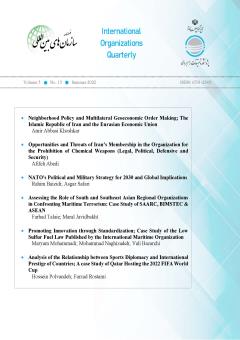-
-
-
Open Access Article
1 - Globalization of Democracy, Transnationalization of Norms, and Plurality of Players in International Organizations
Mohammad یزدانپناه شورهگل سید محمدکاظم سجادپورDue to rapid globalization, theoretical and practical areas of human life have undergone profound changes and, as a result of compactness of time and place, domestic and foreign spheres of nation-states have become intertwined. One of the most important examples of this MoreDue to rapid globalization, theoretical and practical areas of human life have undergone profound changes and, as a result of compactness of time and place, domestic and foreign spheres of nation-states have become intertwined. One of the most important examples of this situation is the relationship between democracy within the nation-state and the wave of globalization beyond national borders. The main goal of this paper is to describe and expound the effects of globalization of democracy at international level on the real nature of international players and their performance in international organizations. The main question of the paper is: “What impact does the globalization of democracy have on international players in international organizations?” In response, the paper claims that “globalization of democracy has given birth to transnational democratic norms, thus, leading to plurality of players in international organizations.” The present study also poses a number of secondary questions, including those about the quality of globalization and its effect on national democratic states, emergence of nongovernmental players and their functions within international institutions. To do this, a descriptive-analytical method has been used in this research. Manuscript profile -
Open Access Article
2 - The Role of International Organizations in the Realization of the Right to Food
Farhad Talaie علی رزمخواهThe right to food, a basic right of every person, is the right to be free from hunger and have sustained access to food with acceptable quantity and quality which would meet their food and cultural needs. Although States are the main parties responsible for the realiz MoreThe right to food, a basic right of every person, is the right to be free from hunger and have sustained access to food with acceptable quantity and quality which would meet their food and cultural needs. Although States are the main parties responsible for the realization of human rights, both at domestic and international levels, increased activities of international organizations on an international scale, especially in the field of human rights, have raised questions as to the role of these organizations in realizing the human right to food and how they discharge that role. As argued in this paper, international organizations play an effective and unique role in the realization of the right to food at the international level. It is also noted that such international bodies address different aspects of the various issues related to the right to food. The paper concludes that the main goal of such activities is to realize the human right to food, especially for the poor people suffering the worst from unfavorable food security in the world. Manuscript profile -
Open Access Article
3 - Contending Theories and the Analysis of International Organizations and Institutions, Peace, Security and Justice
Seyed Abdolali ghavam Samira MohseniThe analysis of international organizations and institutions, peace, security and justice based on contending theories, in different ontological, epistemological and methodological frameworks, can help us to achieve a better understanding of the concept of international MoreThe analysis of international organizations and institutions, peace, security and justice based on contending theories, in different ontological, epistemological and methodological frameworks, can help us to achieve a better understanding of the concept of international relations and demonstrates a more realistic picture of international institutions, processes and events. Obviously, the precise analysis of phenomena and events largely depends on the above strengths and weaknesses of mainstream and critical theories in explaining the above mentioned concepts Manuscript profile
List of Articles international organizations
-
The rights to this website are owned by the Raimag Press Management System.
Copyright © 2017-2024


